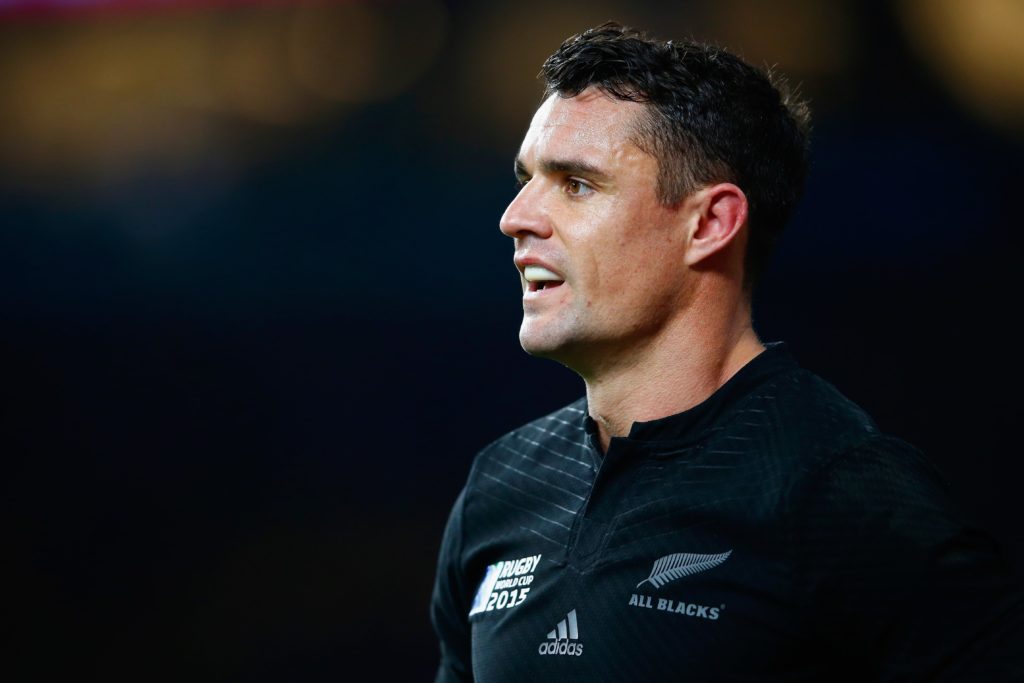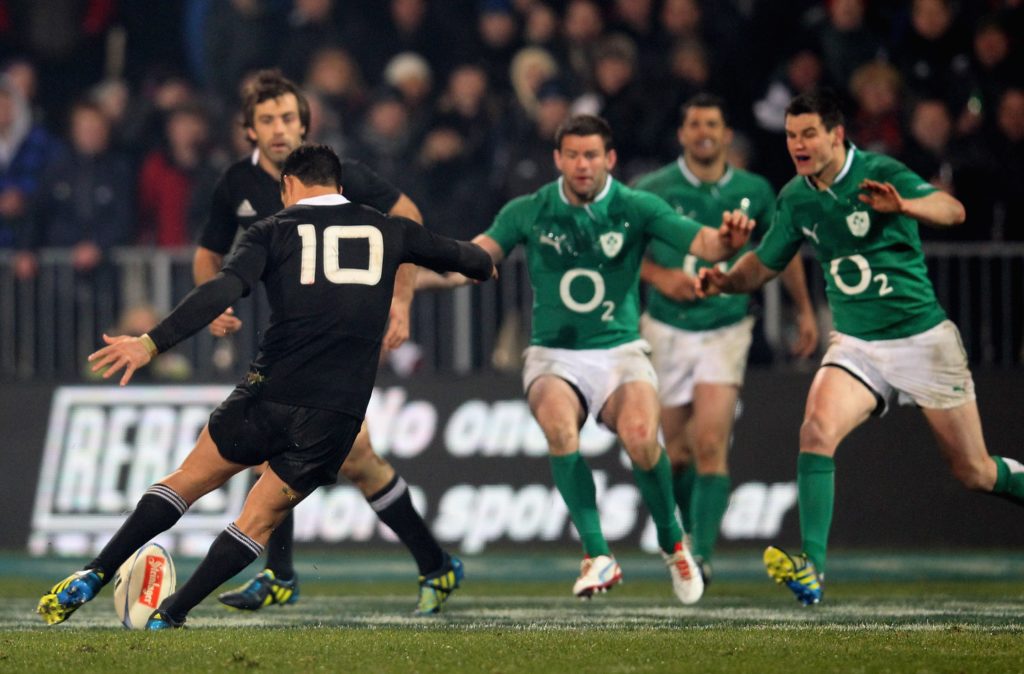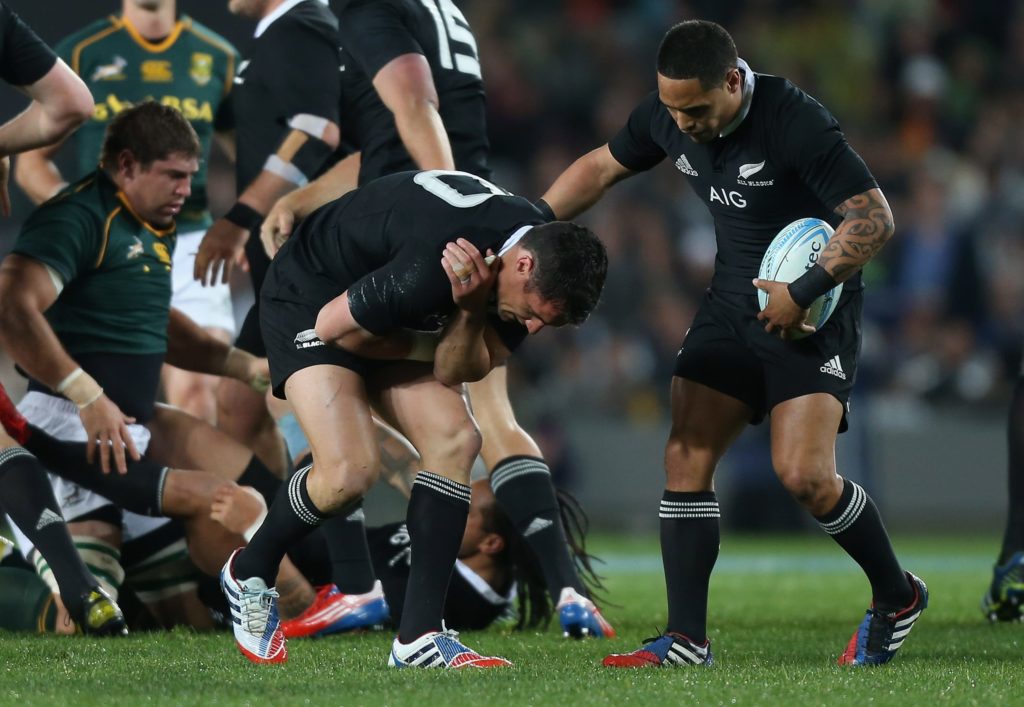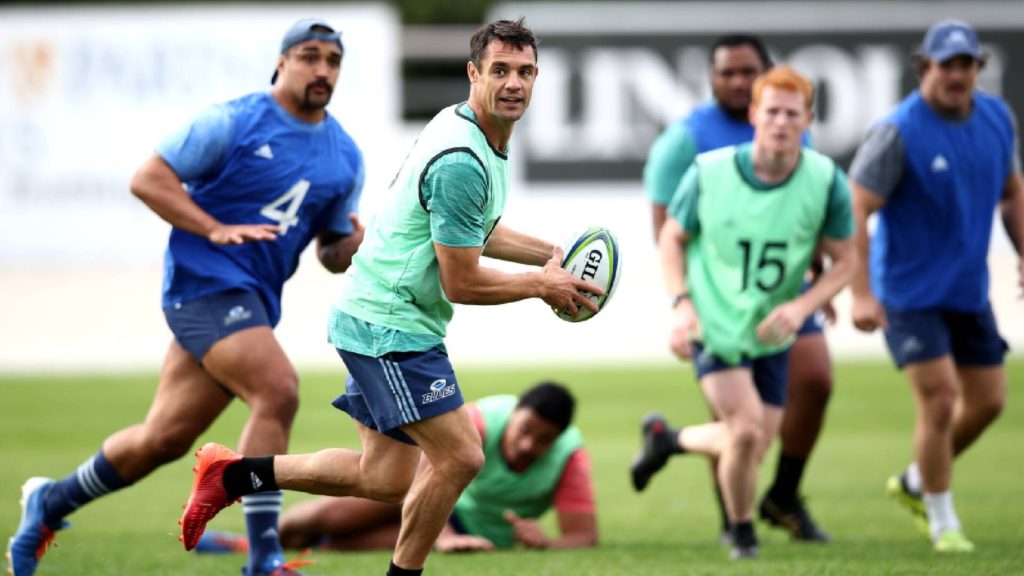Nobody, not even Daniel Carter himself, would have guessed that it would be mental rather than physical exhaustion that led him to retire.
But he’s quite adamant, even with his 39th birthday just a few weeks away, that he could have played on for at least one, if not two more seasons in Japan if his mind had been willing.
His legs were good to keep going. The body would have held up well he thinks had he extended his contract with Kobe Steelers. Carter, unbelievably, could have still been slicing through defences at 40, maybe even 41.
That was something that appealed to him – to be re-writing what is possible in rugby and to change mind-sets about how long players can stay at the top of the game for.
“When you are playing in your mid-to-late 30s, you start to reach new boundaries where you want to change the narrative a little bit about rugby players,” he says.
“You see the likes of Tom Brady doing incredible things at his age. Roger Federer and Rafael Nadal are doing the same in their sport, so there were people who I looked to and thought I wanted to do that for rugby players. For it to be more acceptable for players to play into their mid to late 30s.”

He won’t be playing at 40, but Carter can be certain that he did achieve his goal of pushing boundaries. He’s hardly the first late 30-something to have been holding a professional contract in an established league, but he’s probably the only one who was still an integral part of a winning team.
And this is where Carter’s legacy will no doubt grow in time. What sets him apart is that the titles continued to come throughout his 19-year career.
There was no obvious fade in his influence – no point where anyone could have said he hit the wall and was hanging in there just for the money or fear of not knowing what else to do with his life.
Carter was a winner at every post. He won Super Rugby with the Crusaders as a 23-year-old and the Top League with Kobe when he was 36. He’d probably have won again as a 37-year-old had it not been for Covid and anyone unsure whether to place him one ahead or one behind of Jonny Wilkinson on the chart of greatest 10s to ever play, his winning record is reason enough to go with the former.
Carter signed off with the All Blacks as a World Cup winner and World Player of the Year in 2015. He was 33, pushing 34 when he joined Racing 92 after the tournament on a $2m a year package.
When you are playing in your mid-to-late 30s, you start to reach new boundaries where you want to change the narrative a little bit about rugby players.
Dan Carter
It was surely a dud deal for Racing? They were making Carter the best paid player in the world when he had nothing left to prove and was surely just going to collect the money, wave to the crowd and find reasons not to train.
Carter turned up and Racing 92 were crowned champions in 2016. They made it to the final of the European Cup the following year but were beaten by Saracens. That was the Carter effect.
He transformed the club. They had been a play-off team before he arrived and he jumped them into being champions. He left in 2018 and Racing haven’t made the final since. They are once again a play-off team.
If Racing weren’t mad to buy Carter on a breath-taking contract, then surely Kobelco Steelers were when they signed him in late 2017? Carter was 35, almost 36. He was open that he had decided against staying in France for another year because of its intense physicality and the fear it would pummel him into submission.
Japan appealed because of its shorter seasons, less intense rugby and because it was only one flight from New Zealand as opposed to two. It may have sounded like he joined with strong thoughts of retirement being close, but Kobe finished 2018 as champions and Carter finished the season as the league’s official player of the year.
“In 2015 I had this new drive that I wanted to be part of winning cultures and winning teams as that was what I had been part of with the Crusaders and All Blacks.
“Wherever I go, I am not there just to pick up a pay cheque – I am there to drive this team, to help them and win championships. I was fortunate enough to do that with Racing and Kobe.”
Carter was simply not interested in just playing. His desire to win and be part of a champion side was what defined his career.

He won Super Rugby with the Crusaders in 2005, 2006 and 2008. He won the Rugby Championship in 2005, 2006, 2008, 2010, 2012, 2013 and 2014 and never lost a Bledisloe Cup series. He was instrumental in defeating the British & Irish Lions in 2005, won two World Cups and French and Japanese league titles.
He was the ultimate all or nothing guy, something that began to register within him in 2019 when he was back in New Zealand trying to recover from neck surgery.
“The first year I was in Japan I loved it,” he says. “It re-energised me and I thought it was great. I came home to New Zealand and had an operation on my neck which meant I was out of rugby for a long time and spent a lot of time at home.
“There was still a driving force inside me at that stage, that I wanted to rehab and return to play, which I did. But in going back there I found it quite tough. That was the first time I had questions about whether I wanted to be there or not – being away from my family.
“But I was like, ‘I am going to be here because there is nothing I can change and I am going to give it everything I have got.’ It was angling towards being my last season anyway even though I felt my body was good and that I could have played there for a few more years.”
He realised who he was definitively when he was forced back to New Zealand last year as a result of the pandemic hitting mid-way through the Japanese season.
He was the ultimate all or nothing guy, something that began to register within him in 2019 when he was back in New Zealand trying to recover from neck surgery.
“I got forced back and was gutted about that,” he says. “I was coming off contract and I guess the frustrations of not being able to finish the Japanese season and then going to the Blues for a little bit, I loved that. I loved being part of the team environment but going through that process it made me realise that I play to be the best player out on the field.
“That is my drive and it always has been and I just didn’t have that drive back here in New Zealand. I had nothing to prove and nothing to get my motivation levels up to where they should have been to play against all those young bucks here.
“That kind of made me ask whether I wanted to play in New Zealand or not. I was looking for new contracts because I thought that was a way to provide for my family.
“When I realised the age my kids are and the amount of work [wife] Honor was doing looking after them while I was away chasing my dream, it made me realise it was time to stop. The more I took time off the more I realised I didn’t want to play overseas and not having the drive to play here I knew in my mind the time was right.”
If all this late career winning wasn’t remarkable enough, it has to be remembered that it came after Carter had endured a miserable three years between 2012 and early 2015.

He featured in barely every third test and his luck was summed up when he ripped his Achilles at Twickenham on his 100th appearance for the All Blacks. He limped off at Twickenham in November 2013, took a six-month sabbatical and then broke his leg when he returned to play in May 2014.
When he was still troubled by that leg – the nerve endings were damaged and caused him considerable pain in early 2015 – the All Blacks selectors began to have serious discussions about whether they could even take him to the World Cup in England.
Carter had no form on the board, he had no confidence and he looked broken and just about finished. Under almost any other coach, Carter would have been dumped, but Steve Hansen never lost faith in his preferred play-maker.
Hansen stuck by him and Carter repaid the faith with a stunning campaign in England. “It is hard to go past 2015 [as a career highlight],” he says. “The reason I had the dream of being an All Black is that when I was five, I saw the inaugural World Cup. I watched John Kirwan score the length of the field try against Italy and I went out to the backyard to emulate that and David Kirk holding aloft the Webb Ellis trophy.
“From that moment, I wanted to be an All Black and it took me four World Cups to be satisfied with getting to that moment. In 2003 we were unsuccessful as we were in 2007. In 2011 we won it but I was injured so to do it when I had committed for that to be my last opportunity was a fairytale finish and in sport you don’t often get those fairytale finishes.
“That was such a deeply satisfying moment for me personally to have gone through that roller coaster and to be able to share it with a lot of really good mates – guys who I had played much of my career with.
“To be able to share that moment with them and be part of an All Black team that won back-to-back World Cups was a great way to end my career.”

And there was one player in particular he was glad to be able to share that last adventure with. Which of course was Richie McCaw.
The two had been playing together for Canterbury since 2002 and the All Blacks and Crusaders since 2003. They were almost an item – a package and both men recognise how much they owe to the other.
They saw the game the same way and they both had this insatiable desire to get better. “Has to be Richie,” says Carter when he’s asked about the player for whom he has the greatest respect.
“His mental strength is something unparalleled. I haven’t seen it with any other player. We worked closely throughout my whole career and we evolved from being two young players being thrust into the limelight and then into leadership roles even though his was a lot more than mine.
“I wanted to be a good sounding board and help him achieve what he wanted to achieve and just to see his mental strength and where he wanted to take his game and the team’s as a leader, that was inspiring.
“I just wanted to be on that journey and support him, help him in whatever way. To work so closely with him on and off the field it was a dream to have a player of that quality. He’s definitely the player I learned the most from.”
Having made the decision to retire, Carter says he has no desire to move into coaching. Rugby has been his life since 2002, but it’s not all he knows. Nor is he interested in giving up full-time playing to swap it for full-time coaching.
“I don’t have the desire to coach,” he says. “I have a five-year plan and coaching is not a part of that. Being involved in rugby whether it is part-time kick coaching, mentoring or working with leadership groups… those kind of things… I’d love to.
“I did a little bit of work with Newcastle Knights last year and my stint with the Blues which was more about helping the leadership group than playing. I am really passionate about sport and rugby and sharing my knowledge of the game. I have learned a few things in my time and there is no point in bottling it all up. I’m happy to share my experiences.”



Comments
Join free and tell us what you really think!
Sign up for free